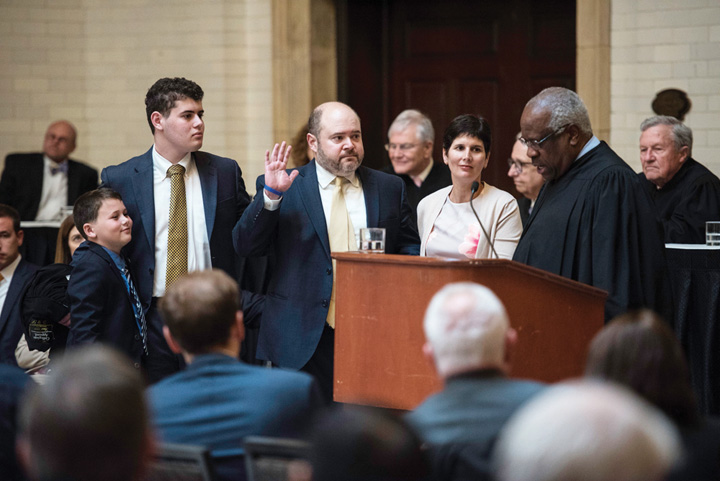
Judge David Stras, a former Kansas Citian who is believed to be the second Jew ever to serve on the U.S. Court of Appeals for the Eight Circuit and the first to serve on the Minnesota Supreme Court, was sworn in on the Eighth Circuit court on May 18, 2018, by U.S. Supreme Court Justice Clarence Thomas.
Stras is 43 and lives in Minneapolis. He was born and raised in Wichita and lived in the Kansas City area during his sophomore and junior years while he attended Blue Valley North High School. He also attended and was confirmed at The Temple, Congregation B’nai Jehudah during that time.
His mother, Andrea Stras, and his brother, Daniel Stras, both live in Overland Park. His paternal grandparents, Walter and Malvina Stras, were Holocaust survivors. His grandfather was from Germany and his grandmother was from Hungary. They are buried in Sheffield Cemetery in Kansas City, Missouri.
Stras was on President Donald Trump’s list of possible U.S. Supreme Court nominees.
Serving on the Eighth Circuit court is “a tremendous honor,” he said. The court’s jurisdiction comprises Arkansas, Iowa, Minnesota, Missouri, Nebraska, North Dakota and South Dakota.
“When your country calls you to public service, it is both flattering and an honor,” he said. “In the job I’m required to do, and did on the Minnesota Supreme Court, we decide extremely important cases.”
Stras clerked for three different federal judges, including Thomas. He was a law professor at the University of Minnesota Law School from 2004 to 2010 and director of its Institute for Law and Politics. He was an associate justice on the Minnesota Supreme Court from July 2010 until he received his judicial commission on the Eighth Circuit court on Jan. 31, 2018.
He never actively sought a judgeship, he said, but he always had in the back of his mind that he’d be interested in becoming a judge if the opportunity arose. He first knew he wanted to become a lawyer around the time of his Bar Mitzvah; the credit goes to a fictional TV lawyer.
“I used to watch the black-and-white reruns of “Perry Mason,” Stras said. “I was so fascinated by the argumentation, the process. I just thought it was a great thing. I never wavered after that. Of course, practicing the law isn’t like a TV show. There’s a lot more preparation and work on the front end.”
Being Jewish affects every facet of his life, Stras said, including his work as a lawyer and judge, though he strives to set his personal experience aside when he decides cases.
“My faith is important to me,” he said. “I grew up as a Jew and I’ve always been a member of a congregation throughout my life. In Sunday school growing up, I was always fascinated by the legal aspects of religion. That’s had an indirect influence on how I got to be a lawyer.”
He received a bachelor’s degree with highest honors from the University of Kansas in 1995, and Master of Business Administration and law degrees from KU, both in 1999. He was editor-in-chief of the Criminal Procedure Edition of the Kansas Law Review.
In describing the importance of the rule of law, Stras made a comparison to what occurred in Nazi Germany.
“My grandfather talked to me about the importance of laws in a society,” he said. “That broke down in Germany. The law protects civil liberties, preserves the structure of government and maintains order.”
In late 2016, Stras gave the keynote speech at the 17th-annual dinner of the Twin Cities Cardozo Society, an association of Jewish legal professionals. He told of having written a book report in high school on “Mein Kampf” by Adolf Hitler and how the book had affected his thinking about the rule of law.
“It was in reading that book that I realized how a single person or a single movement, if left unchecked or unaccountable, can pervert the rule of law,” Stras said in the speech. “If those in power can lead with their own sense of what is right without the constraints of the rule of law, then our most import institutions can become co-opted and our safeguards broken down. The lack of accountability and the diminishing role of Jewish lawyers in the Third Reich provide us today with a stark lesson about the fragility of our legal institutions, and also how crucial it is that they remain fully operative.”
His allegiance to the rule of law has stayed with Stras throughout his legal career. Advancing as a judge “has been his dream,” his mother said.
“He had the opportunities to stay at many law firms, making an amazing amount of money,” she said. “He always wanted to do this, and eventually make it to the U.S. Supreme Court. If you have a dream and believe in yourself, you can do it.”


